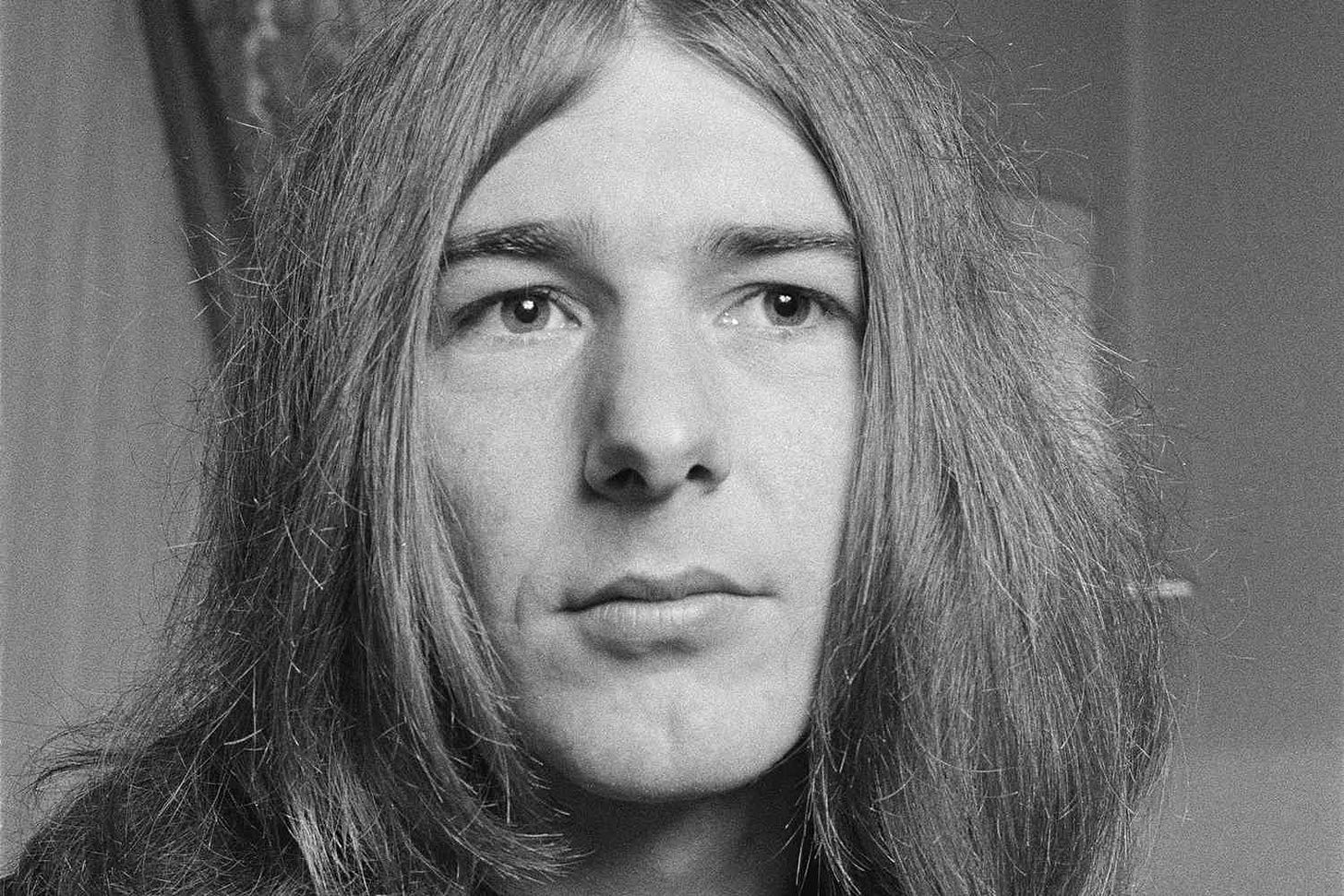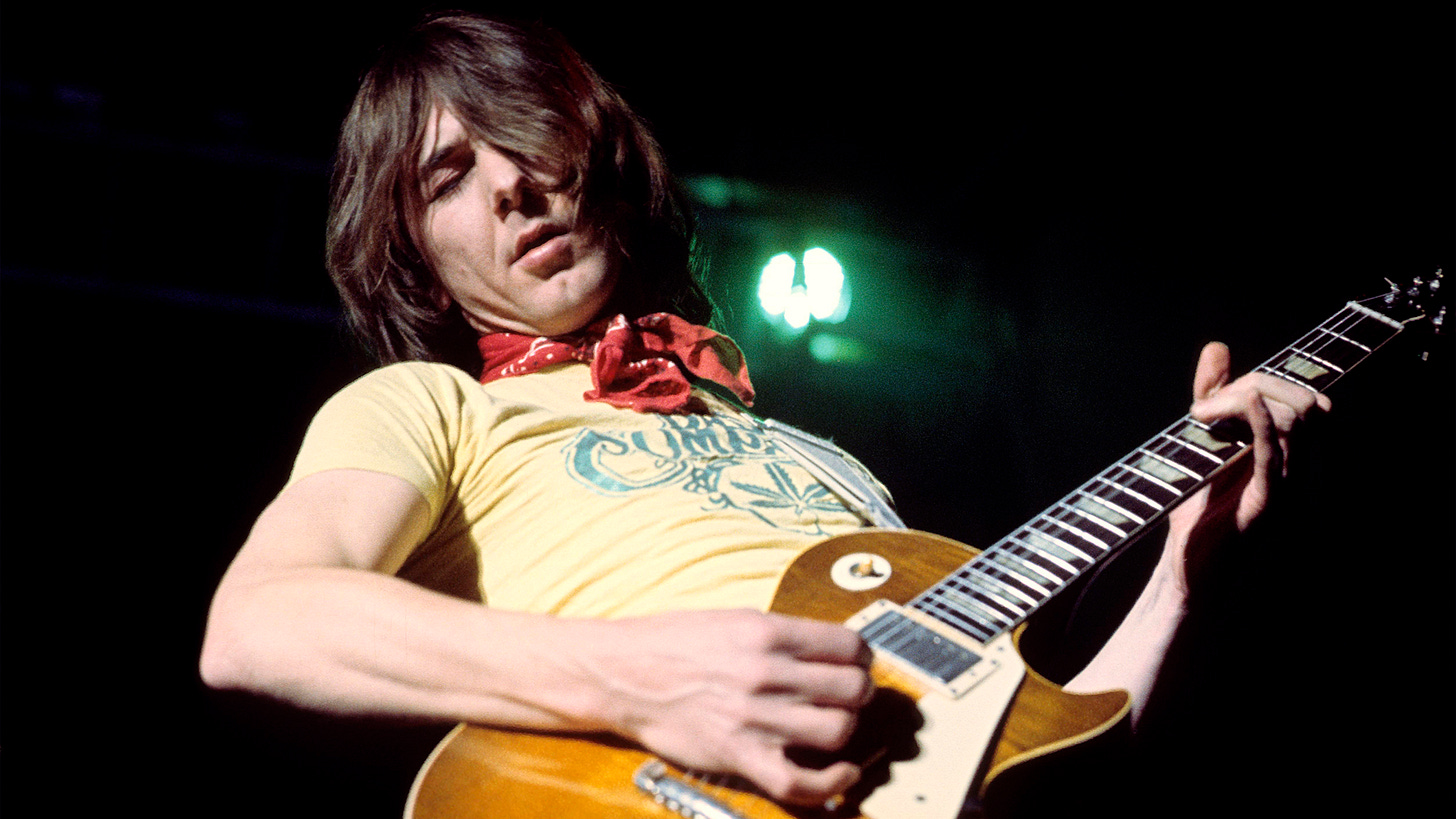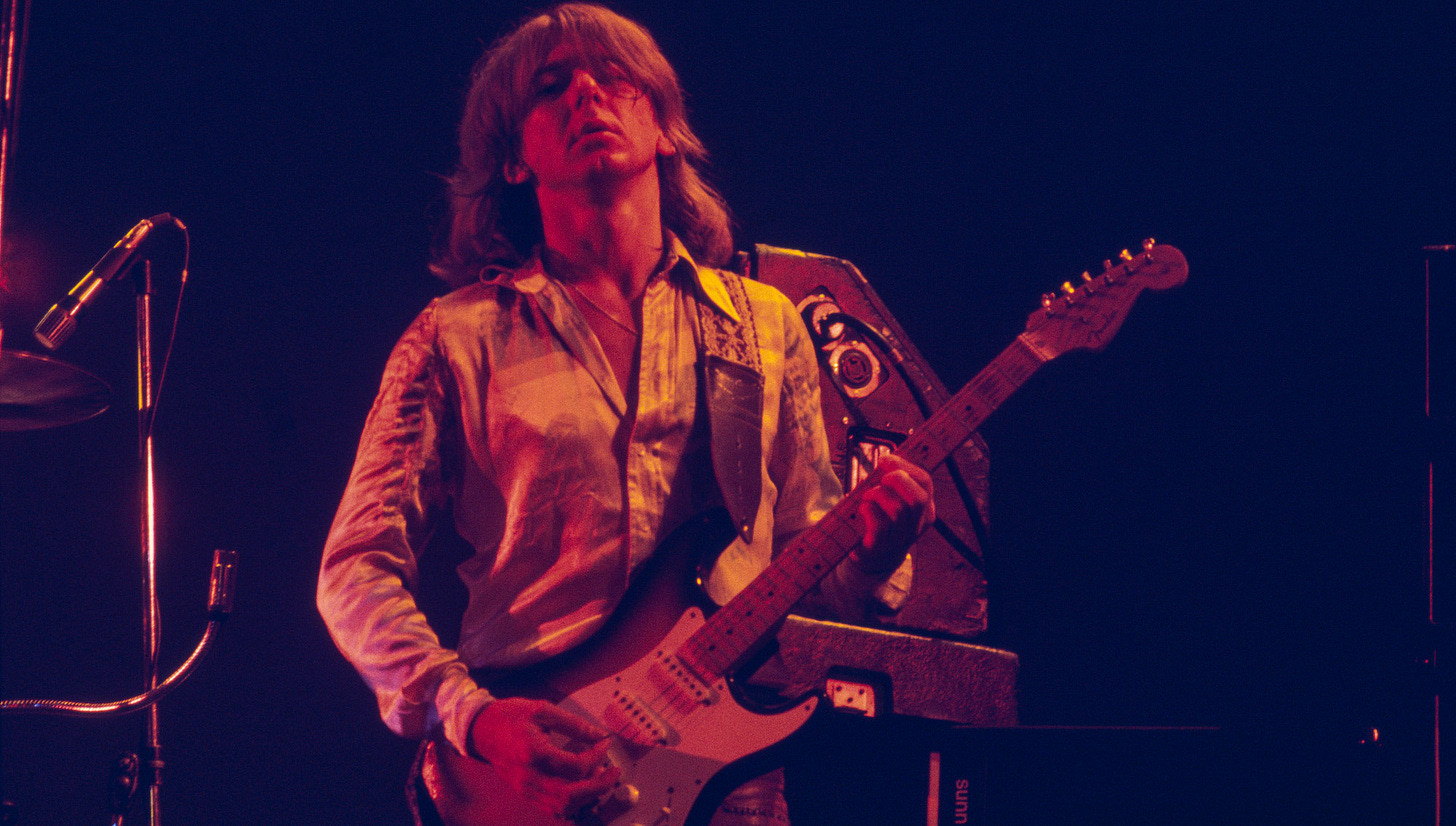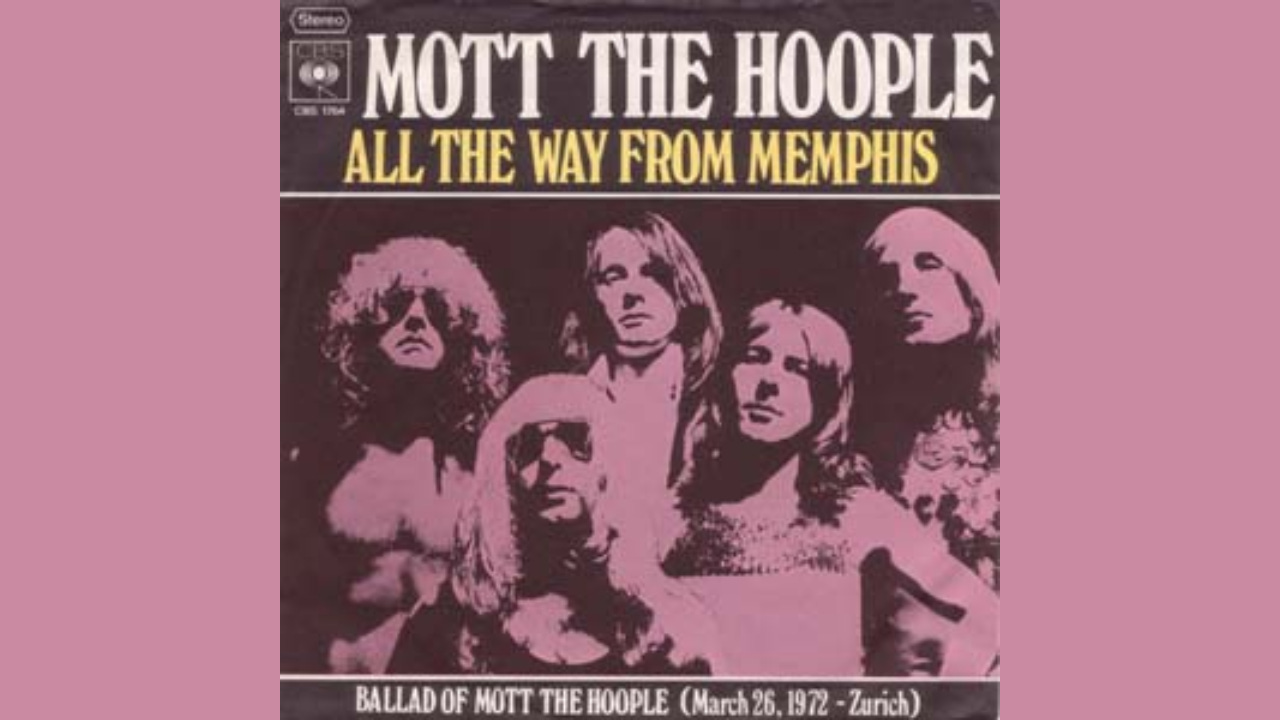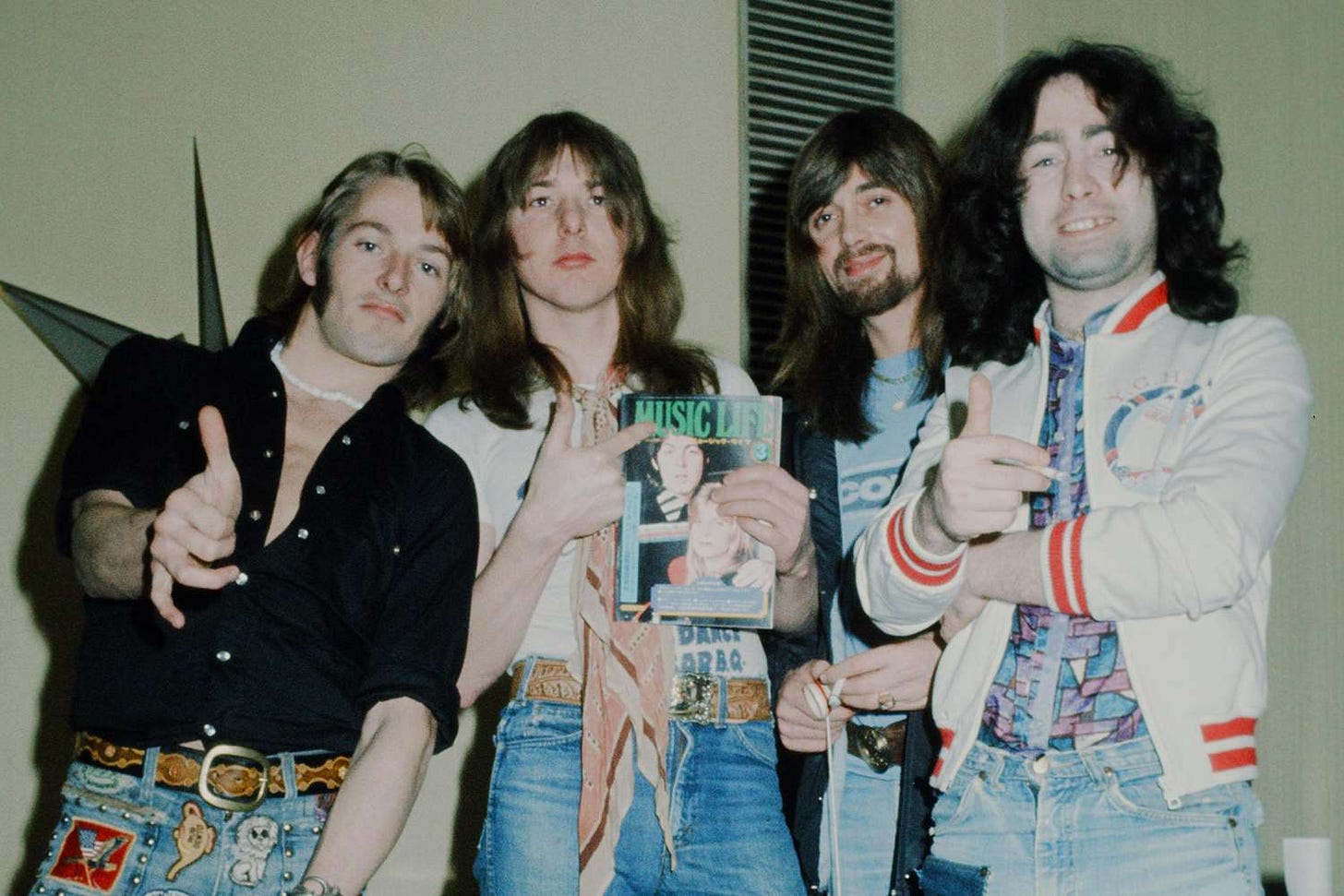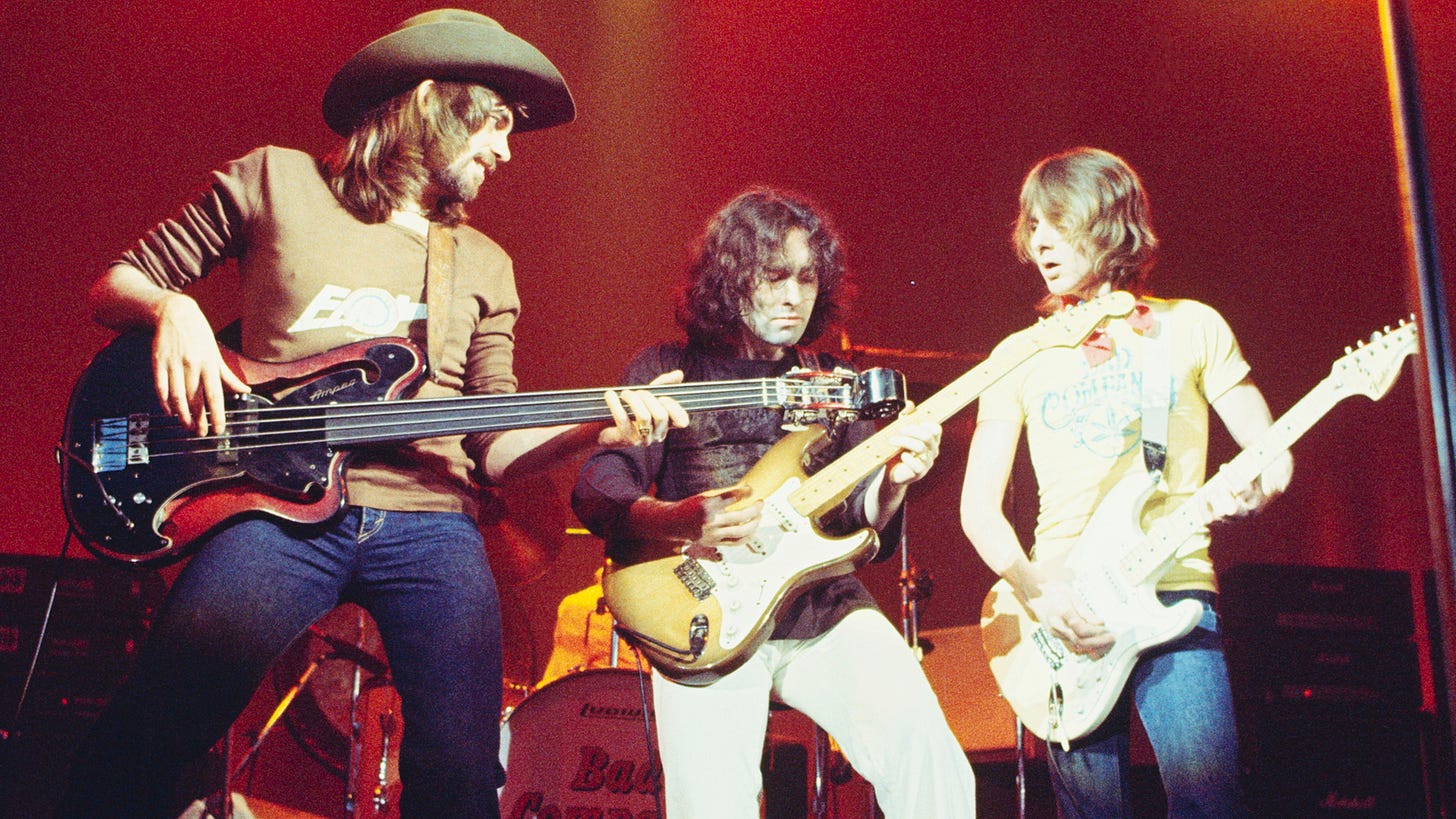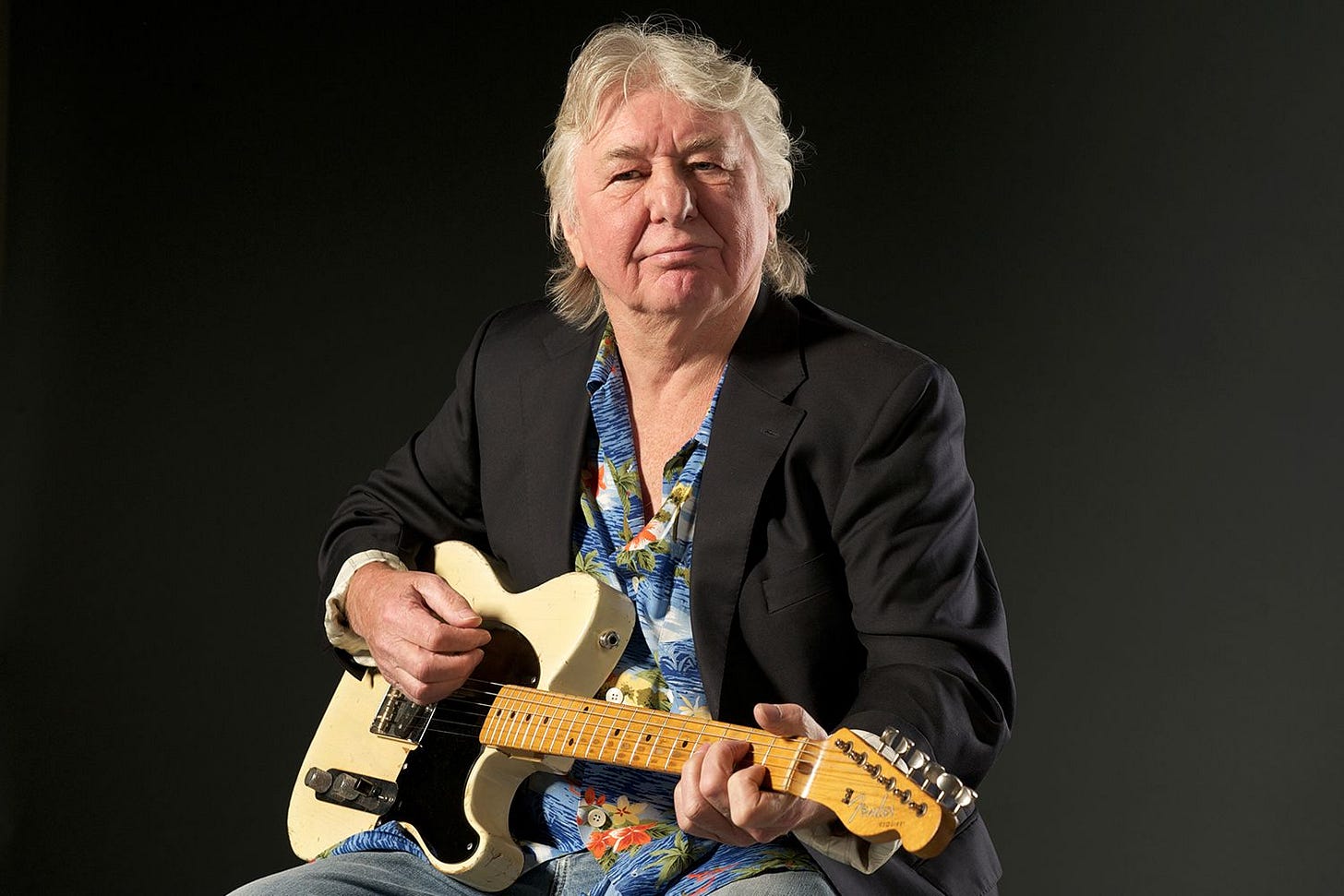Mick Ralphs Dies at 81: Remembering the Bad Company and Mott the Hoople Guitar Legend
From Mott the Hoople's glam rock anthems to Bad Company's stadium-filling hits, Ralphs crafted the soundtrack of a generation. This is for the Music 101 podcast & the live interview is posted.
With the recent passing of Mick Ralphs, can you introduce him to fans or those who might want to be?
You know it don’t come easy (nod to Ringo), and “It Ain’t Easy When You Fall,” with the passing of Mick Ralphs, Ralpher, for fans, the Ian Hunter song has a double meaning.
In the competitive but other times easy-going manner between bandmates and musicians, the Ian Hunter-Mick Ralphs collaboration stands out. As a guitarist, Ralphs was never flashy. He played with feel, not fuss, favoring punchy chord riffs, melodic solos, and a blues-informed touch that served the song above all else. Though modest about his accomplishments, Ralphs was a versatile and skilful guitarist who could play anything from crunching power chords to delicate acoustic picking, and was also a major songwriting contributor.
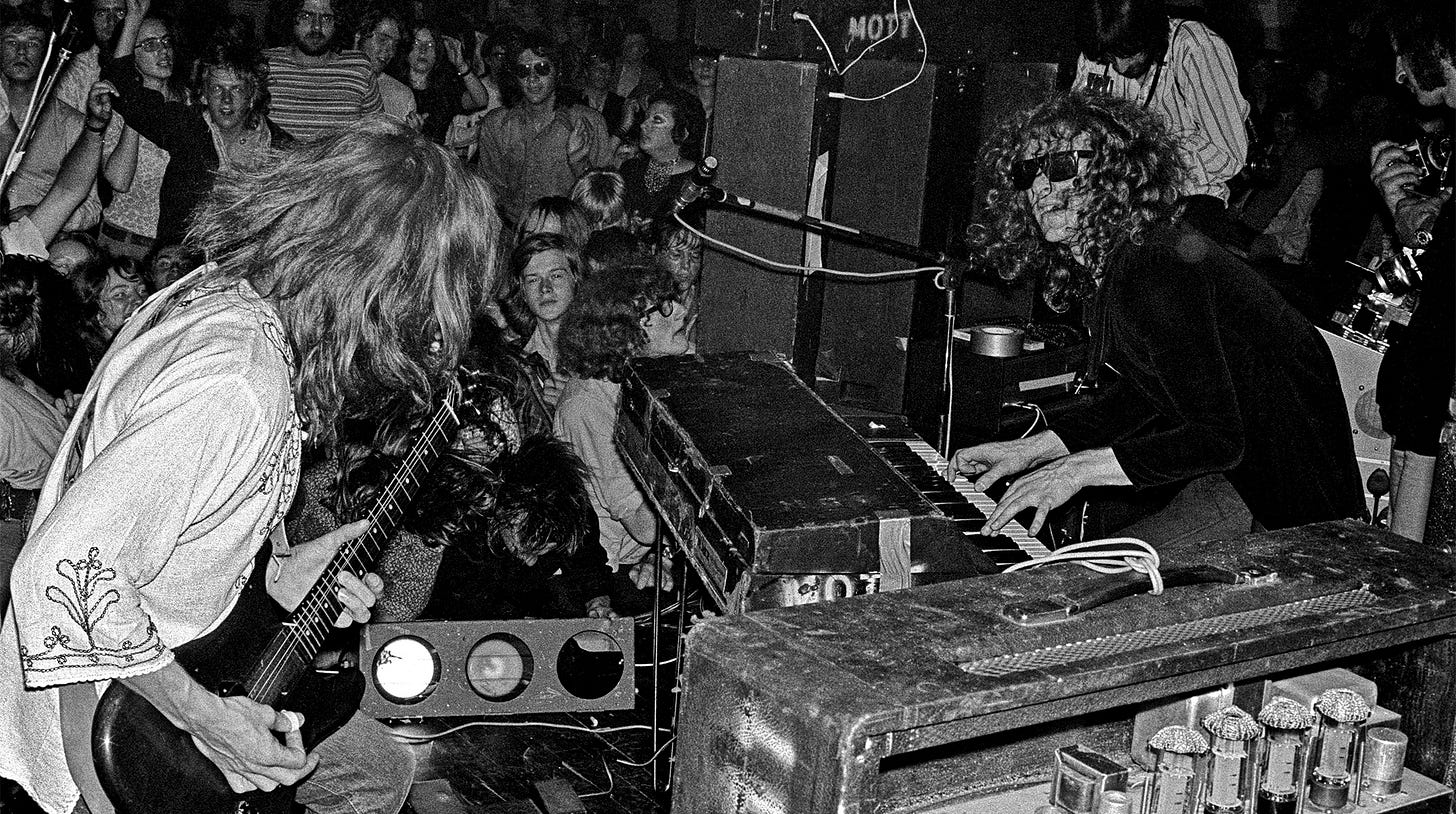
The bandmates were the standouts originally in Mott The Hoople, Ralphs, a founding member, and Ian, joining them before their first record in 1969. Hunter penned “It Ain’t Easy When You Fall” for Mick.
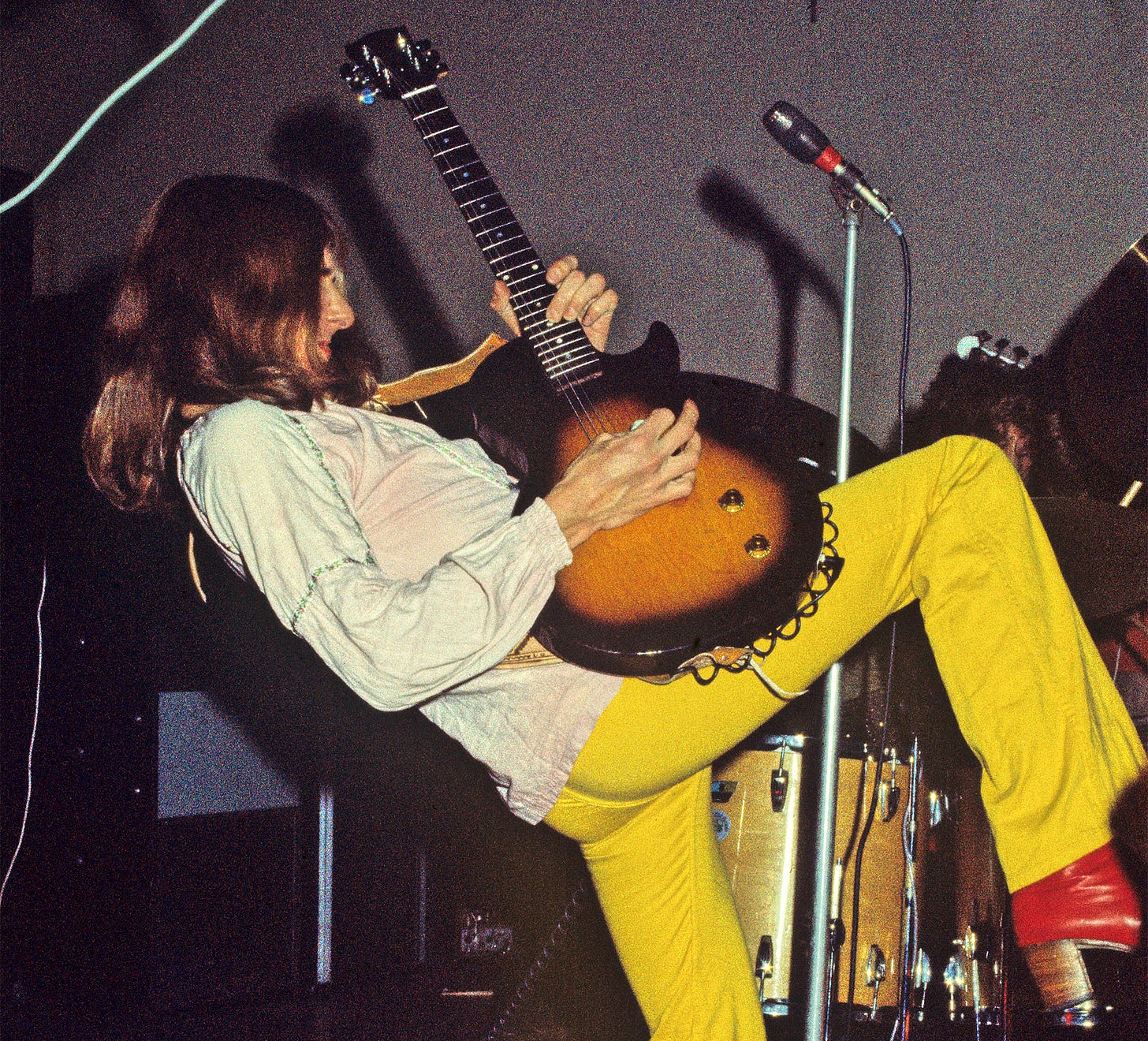
The song appears on Ian Hunter's 1975 debut solo album and contains traveling imagery, "You talk of ships you talk of boats you talk of games" -not surprisingly for a mostly touring band and Mick’s reluctance about traveling.
The theme is friendship about someone who has fallen on hard times and is no longer around, which in the context of Ralphs and Hunter relates to his departure from Mott the Hoople to be a founding member of Bad Company.
It Ain't Easy When You Fall
(Ian Hunter)
You used to float just like a boat upon the tide
You used to run when things were done you used to hide
You talk of ships you talk of boats you talk of games
And now you're down you ain't around its such a shame
Cause you got something to give
Something to hold onto
Why don't you live
And you just forget about fixing up fate
Maybe you'd stop pick yourself up
Now its too late Oh
It ain't easy when you fall
It ain't easy when you fall
It ain't easy when you fall
No it ain't no good at all
You didn't know this world ain't slow you gotta move
You made no sound I watched you drown I watched you loose
Your loneliness you knew it best but its a drag
Cause in the end I lost a friend I feel so sad
Cause you had something to give
Something to hold onto
Why did you live
If you just forgot about fixing up fate
You'd be here you'd be near
Now it's too late Oh
It ain't easy when you fall
It ain't easy when you fall
It ain't easy when you fall
No it ain't no good at all
Oh-oh hey
It ain't easy when you fall
(fade)
In conclusion, bandmates Ralphs and Hunter were friends and musical partners while in Mott The Hoople.
How did Ralpher get his start in music and how did he contribute to Mott The Hoople?
Ralphs was born in Stoke Lacy in Herefordshire. “I’m a country boy,” he would say later, “Originally from Herefordshire, where the cattle come from.” He began his music career in his teens and recalled being inspired by the Booker T & the MGs’ hit “Green Onions.”
He initially played in a blues-rock band, the Buddies, and they released one single, “It’s Goodbye”, which they sold at gigs. The song is included on Mott The Hoople – All The Young Dudes - The Anthology. After the single was released, Stan Tippins replaced Les Norman as the vocalist in November, 1965, and he convinced the band to bring in Overend Watts. The band played in Germany and then changed their name to The Problem. During a later tour of Germany, Dave Mason (of Traffic) deputised for Pete Watts, who was ill at the time. Mason then suggested another name change to Doc Thomas Group, inspired by the blues phrasing of Steve Cropper and Albert King, and Mick started on rhythm guitar. They released an album in Italy while they were gigging there with Tippins on lead.
The band would change their name to Silence before rebranding to Mott The Hoople in 1969. Ralphs would remain a member of the band and feature on their first six albums, earning praise from fans largely because of Mott’s stage act. They were a successful touring and live act, but couldn’t break into the charts.
The band broke up when they thought they were at the end of the rope, appearing in a converted gas tank in Switzerland. What could be worse than no hits on the charts and playing a dead-end gig? It appeared that they had hit rock bottom. What appeared to be their denouement was documented by Hunter in his song The Ballad of Mott The Hoople.”
“Ballad Of Mott (March 26th 1972 Zurich)”
(Ian Hunter/Overend Watts/Mick Ralphs/Verden Allen/Dale Griffin)
I changed my name in search of fame
To find the Midas touch
Oh I wish I'd never wanted then
What I want now twice as much
We crossed the mighty oceans
And we had a few divides
But we never crossed emotion
For we felt too much inside
You know all the tales we tell
You know the band so well
Still I feel, somehow, we let you down
We went off somewhere on the way
And now I see we have to pay
The rock'n'roll circus is in town
Buffin lost his child-like dreams
And Mick lost his guitar
And Verden greyed a line or two
And Overend's just a rock'n'roll star
Behind these shades the visions fade
As I learn a thing or two
Oh but if I had my time again
You all know just what I'd do
Rock'n'roll's a loser's game
It mesmerises and I can't explain
The reasons for the sights and for the sounds
We went off somewhere on the way
And now I see we have to pay
The rock'n'roll circus is in town
So Rock'n'roll's a loser's game
It mesmerises and I can't explain
The reasons for the sights and for the sounds
The greasepaint still sticks to my face
So what the hell, I can't erase
The rock'n'roll feeling from my mind
From my mind...from my mind...from my mind
From my miiiiiind...from my miiiiind...from my miiiiiiiiind
From my miiiiiiiiiiiindSelf-reflective and resigned to their fate, Hunter recounts the story of how Mott broke up, mentioning each of his bandmates by name, to wit, “Mick lost his guitar.”
(Image credit: Fin Costello/Redferns)
Mick losing his guitar story was important to the band and its persona. For Ian Hunter, the tale of a mislaid guitar has been the substance of Mott the Hoople’s 1973 classic “All the Way From Memphis.”
The key line is about the forgotten “six-string razor” that relates the tale in context.
“All The Way From Memphis”
(Ian Hunter)
Forgot my six-string razor - hit the sky
Half way to Memphis 'fore I realised
Well I rang the information - my axe was cold
They said she rides the train to Oreoles
Now its a mighty long way down the dusty trail
And the sun burns hot on the cold steel rails
'N I look like a bum 'n I crawl like a snail
All the way from Memphis
Well I got to Oreoles y'know - it took a month
And there was my guitar, electric junk.
Some spade said "Rock'n'rollers, you're all the same.
Man that's your instrument." I felt so ashamed.
Now its a mighty long way down rock'n'roll
Through the Bradford Cities and the Oreoles
'N you look like a star but you're still on the dole
All the way from Memphis
Yeah it's a mighty long way down rock'n'roll From the Liverpool docks to the Hollywood Bowl
'N you climb up the mountains 'n you fall down the holes
All the way from Memphis
Yeah its a mighty long way down rock'n'roll
As your name gets hot so your heart grows cold
'N you gotta stay young man, you can never be old
All the way from Memphis
Yeah its a mighty long way down rock'n'roll
Through the Bradford Cities and the Oreoles
'N you look like a star but you're really out on parole!
All the way from Memphis“That was really a bit of poetic license,” Hunter admits. “[Lead guitarist] Mick Ralphs’ guitar was actually stolen at a gig in Long Island a little earlier on our American tour in late ’72, not left behind.” Ralphs also had a fear of flying, recall Hunter’s song and Mick’s reluctance to travel, thus Hunter worried he might skip the Memphis gig after his guitar got lifted.
(Image credit: Watal Asanuma/Shinko Music/Getty Images)
“All he had to do was go back to England and it would have been all over,” Hunter says. “Which I figured he would do. But in the end, he did the gig.”
Memphis magic
All the Way From Memphis arose in Hunter’s home in Wembley, London, in 1973. “I had just gotten married, and we had this old upright piano, with all the white notes gone,” he recalls. “So I started playing around with the black notes, and that’s how the music came together. But the lyrics took weeks.”
It was while musing over the dramas of that 1972 tour that Hunter suddenly happened upon the song’s subject matter.
“I remembered we’d done that gig in Memphis just before that Christmas, where Joe Walsh was opening for us,” he explains. I know that era well, since the following year I saw Mott The Hoople with Joe Walsh and Barnstorm at the Hollywood Palladium. Hunter relates: “A lot of weird things happened. We were told nobody was going to be at the gig, but we hit the stage to a full house. It was kind of a magic night, so the lyric was based around that.”
The difficulty for touring rock bands to make any money comes through since Mott owed time and money to their record label. Ralph’s lead guitar reinforces the lyric’s predicament, as perfectly encapsulated in the line, “You look like a star but you’re still on the dole.” Welfare in England is called the dole.
Hunter agrees. “People don’t realize the investment that goes into it all, which the artist has got to pay off. All this stuff costs money, and the labels have to recoup it. That’s why, back then, you’d see an artist with a top-five single and a Platinum album, but they were broke.” It was not unusual for labels to front the money, promote the band, but the band found out belatedly that they were deeply in debt. It reminds me of Tennessee Ernie Ford’s classic “Sixteen Tons.”
Mainly a Les Paul man
When it came time to record the song, the group entered Abbey Road Studios to lay it down for their next album, Mott. Ralphs recorded his blistering lead lines using his standard guitar-and-amp setup of a Les Paul Jr. into a Marshall amp. “Mick was mainly a Les Paul man,” Hunter recalls. “We had a great engineer in Bill Price, who improved everything we did. That helped a lot to make everything sound great.”
Columbia rules the airwaves
Mott already had a strong following in the U.K., where “All the Way From Memphis” climbed to #10 on the charts. In the U.S, the group’s record label prioritized it to album-oriented FM radio stations rather than the Top 40 AM stations, and the song failed to chart.
“Columbia Records really didn’t know how to market us,” Hunter says. “They thought we were an FM band, and so they weren’t pushing any AM singles. We said, ‘Well, it doesn’t seem to be doing the Rolling Stones any harm, as they’re getting pushed on both AM and FM.’ But for some reason they just pushed us to FM, and it never got airplay.”
Regardless, Mott – the album – hit an impressive #35 on the Billboard 200 chart and helped All the Way From Memphis reach a wider audience than the band’s previous efforts. The song remains a fan favorite and has been covered by Brian May, from Queen, who included it on his 1998 solo album, Another World, aided by Hunter.
“Brian was lovely to work with, a great guitar player and great person,” Hunter reveals. “And he’s a very serious kind of guy. We did the Astoria in London one time, and Brian was going to get up and play with us, but he’s very picky about his guitar, especially his Red Special.
“I was with him in the dressing room trying to explain something about the song. I said, ‘Here, wait a minute,’ and took his guitar off him to show him what I was trying to explain. And you should have just seen the look on his face! He was petrified. He was so scared. There’s just something about guitars and that song.”
In conclusion, by hindsight, even an enduring song such as “All The Way From Memphis,” failed to break the band out of living on the dole.
What can you tell us about the songs Ralphs contributed to Mott?
Among Mick’s best-known songs with Mott The Hoople were “Rock and Roll Queen”
which figured heavily in their live performances.
“Midnight Lady” was also a highlight from their live set.
“It Must Be Love” revealed Ralph’s penchant for country-rock.
“Home Is Where I Want To Be” is a gentle tune and has a country flavor as well.
Other songs not mentioned already and written or co-written by Ralphs include those from their self-titled debut album:
"Rabbit Foot and Toby Time" (Ralphs) – 2:04
"Half Moon Bay" (Ralphs, Hunter)
"Find Your Way" (Ralphs)
Mad Shadows
"Thunderbuck Ram" (Mick Ralphs)
A live version exists of a performance at Fairfield Halls.
"Threads of Iron" (Ralphs)
From Wildlife
"Whisky Women" (Mick Ralphs)
"Wrong Side of the River" (Ralphs)
"It Must Be Love" (Ralphs)
Brain Capers
"The Moon Upstairs" (Hunter, Mick Ralphs)
And, from the LP, All The Young Dudes
"Sucker" (Hunter, Mick Ralphs, Watts)
"One of the Boys" (Hunter, Ralphs)
"Ready for Love/After Lights" (Ralphs)
This song proved to be prophetic because not only was it an important component of Mott, but it would prove to be important for his next musical venture.
Ralphs had been playing for just four years, but he was already regarded as an “all-rounder”: the kind of player who can flatpick or strum rhythm at any speed, launch into a rip-roaring slide, and then sear with an emotion-packed solo, pulling out everything from bent blues notes to flashy side-of-the-pick harmonics.
“I went back and got the lads and said, ‘Come on. I know a few people in London; let’s try and get ourselves a deal,’” he recalled in an interview from Guitar Player. “Then through an old friend of mine, [guitarist] Dave Mason, I was introduced to a guy from Island Records. It was Ralphs that had lit a fire since he pushed to get a hearing with Island Records which at the time was notably for taking chances with bands and allowing them to develop.
Ralphs got in touch with Island Records’ producer and A&R man Guy Stevens, who auditioned them in early 1969. He wanted to sign them, but was not impressed by their vocalist Stan Tippins. The band needed a singer when Tippins became the band’s road manager, and the band became Mott the Hoople, the name taken from a novel by Willard Manus. According to Mick, “To cut a long story short, we got a deal with Island.”
The band had a deal with Island, but unfortunately, no lead singer. Hunter got a ring from a musical associate about the opening vocal slot, and at the audition sang a Bob Dylan song along with Sonny Bono’s “Laugh At Me,” and he got the nod. They were signed as Mott the Hoople with a new singer.
Mott was a good band but had difficulty at first breaking into the U.S. market.
“Went through a lot of different styles,” Ralphs said. “We started out playing some of our own songs, some rhythm and blues, and some blues tunes.”
“Then our manager-cum-guiding light, Guy Stevens, decided that we should do a Bob Dylan Blonde On Blonde–type thing. I liked the way Robbie Robertson played guitar with Dylan, so I was into that. We had an organ player [Verden Allen], so I could play more lead guitar instead of having to keep the rhythm together. Then I’d just sit back and keep the rhythm section together by filling in with chords while the organ player would do his thing. I also started playing the piano a little bit when I joined the group.”
Eventually, though, it began to feel like a grind.
“The group was getting more and more away from what it started out as — a rock and roll band,” Ralphs explained. “It was a good, fun band, like a street band. We never made any money, but we were out there having a hell of a good time, and that was all that mattered.
“But we got to the point where we were disillusioned inasmuch as we were working our asses off and not really getting anywhere. We weren’t on the charts, and we weren’t selling any records. We were just like a cult band.”
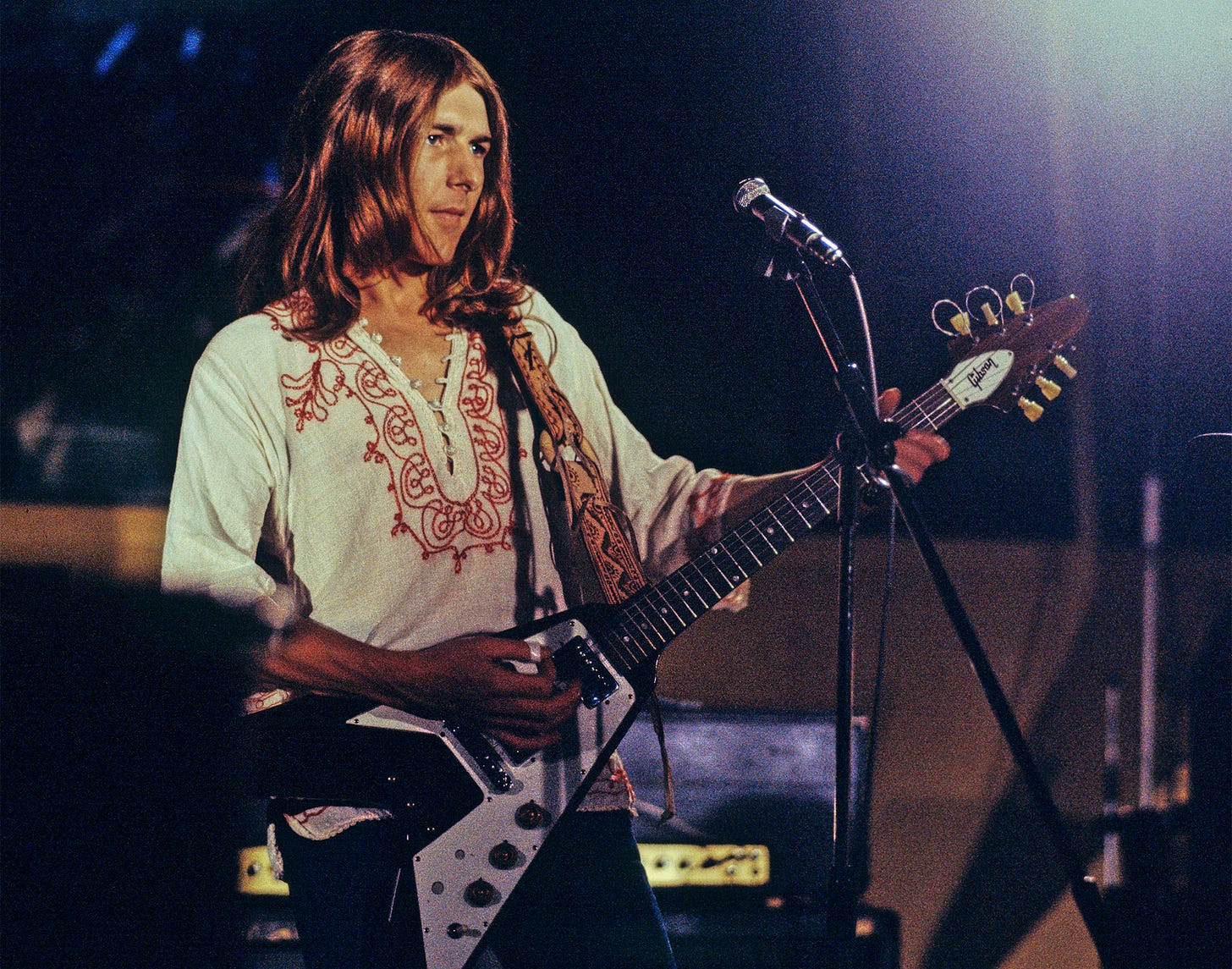
Before their breakout, the highest-selling album in either the UK or the US was Wildlife (1971), which only reached #44 in the UK.
In conclusion, the particular gig that led to their breakup was held in a converted gas tank (or gas holder) in Switzerland, and was so demoralizing that it led to their decision to break up.
Isn’t this where David Bowie stepped in?
Bowie Glam
Exactly, this is when David Bowie stepped in. Bowie had long been a fan of the band, but they didn’t know it yet. And, David was not quite Bowie yet since his career was still building at the time. Ringing Bowie up looking for work, bass player Pete “Overend” Watts told him that they were about to split, and the horrified David offered them a song that they knew from the first hearing was a hit. "All the Young Dudes" was their commercial breakthrough and gave them a second lease on life.
Bowie also offered to co-produce their album of the same name. Quite the fan!
In 1972, David Bowie was just enjoying a career breakthrough with his album The Rise and Fall of Ziggy Stardust and the Spiders From Mars. He thought of “Dudes” as perfect for Mott.
Ralphs remembers the song’s gift as “David Bowie came along one day and said, ‘Well, don’t break up. I’ve got a song that I’d like you to record, regardless of whether you decide to release it or not. I just want you to try,’ ” Ralph’s recalled.
According to Mick, it was the salvation of the band. “It was a big hit in England and America, putting the group on the map.”
After both the song and producing an album Bowie stayed on and the next album was even bigger. Titled simply Mott, it was a top 10 record in the U.K. and became the group’s best seller in the U.S., helped along by the singles “Honaloochie Boogie” and the aforementioned “All the Way From Memphis.”
Demo of “Honoloochie Boogie”
The Mott LP was a crucial time for the band. Hunter and Ralphs collaborated on a song that was indicative of the split to come, that is, the tune, "Violence" (Hunter, Mick Ralphs) and,
"Drivin' Sister" (Hunter, Ralphs).
Live at the Hammersmith Odeon
The entire band contributed to "Ballad of Mott the Hoople (26th March 1972, Zürich)" (Hunter, Dale "Buffin" Griffin, Peter “Overend” Watts, Ralphs, Verden Allen), their denoument song. And, "Rose" (Hunter, Ralphs, Watts, Griffin), the B-side of "Honaloochie Boogie" was a joint effort.
Despite appearances of more collaboration within the band, tensions had elevated, but not before Mick could contribute his stand-out extended song, "I’m a Cadillac / El Camino Dolo Roso" (Ralphs).
The “El Camino Dolo Roso" coda demonstrates Ralphs at his virtual peak, a beautiful, tasteful guitar piece that illustrates just how melodic his compositions could be.
But for Ralphs, the writing was on the wall. He was dissatisfied with the group’s new status as a glam-rock act.
“We got so closely associated with David Bowie that we couldn’t get away from that,” he said. “It was like we were tagged as a glitter group. Then in the end I got the feeling that I was just playing guitar. I could have been anybody up there, not necessarily me.”
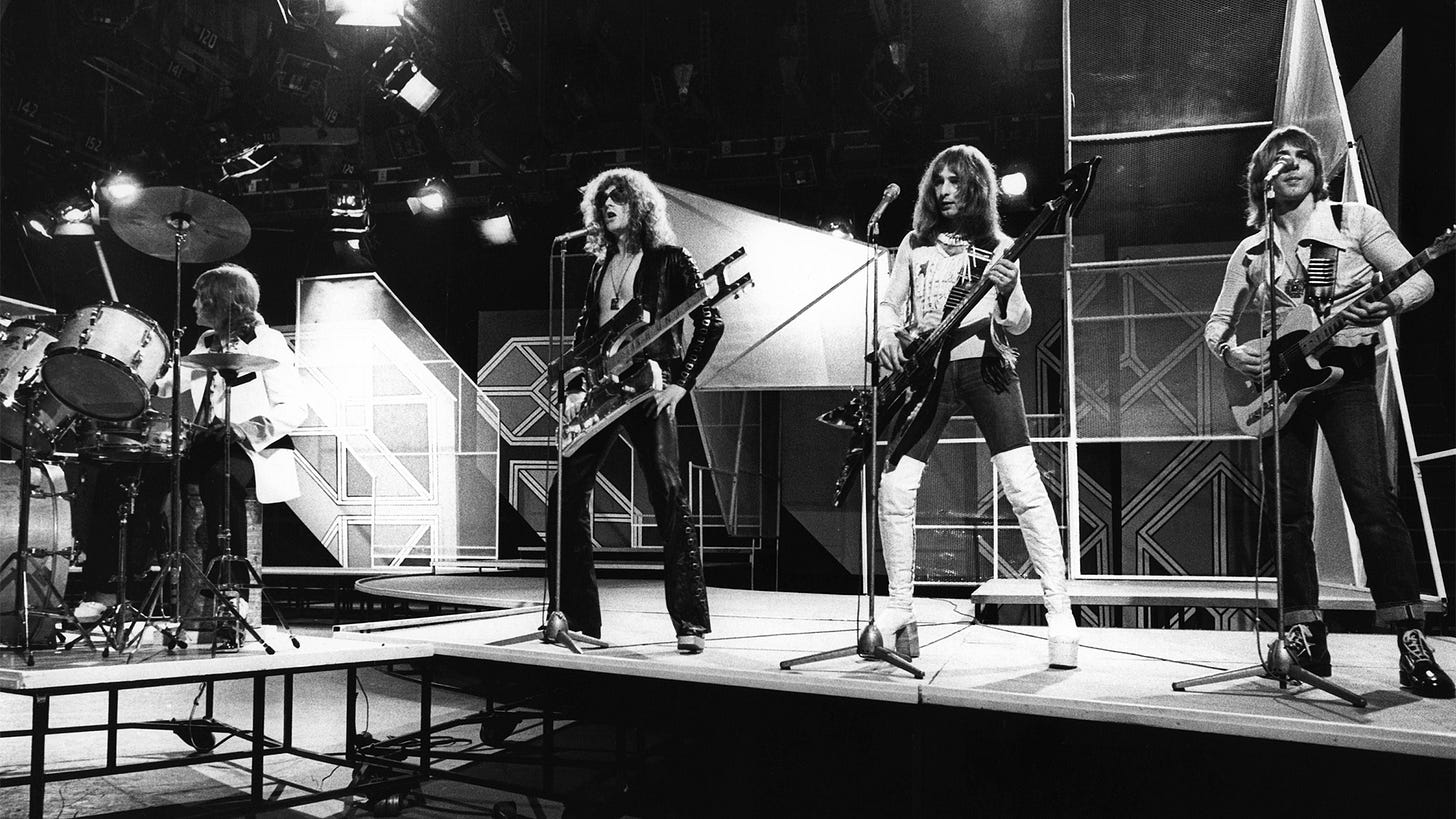
He was also unhappy about Hunter’s performances on his songs. Mott had included an early version of a tune that would later become famous via Bad Company: “Ready for Love.”
In fact, Ralphs had already written other songs that would become hits for Bad Company. But none of them seemed a good fit for Hunter.
“I had songs like ‘Can’t Get Enough’ and ‘Movin’ On,’ which we never used with Mott because Ian Hunter couldn’t sing them,” Ralphs said. “This is not a derogatory remark toward Ian — they were just not his style. He was more into screaming about politics, and I was into singing about being on the road and the usual things blues songs are about, the day-to-day things.
It got to the point where Ian and I were clashing, and I said, ‘Look, you do what you want to do, and I’ll go off and do what I want to do.’ If I met him today, I’m sure I’d get on really well with him, though. It just got to the point where we couldn’t work together anymore.”
In conclusion, Ralphs made a major contribution to the band, but over time, there was diminishing interest in the group effort.
What was the breaking point for Mick to leave Mott The Hoople? And, survey the career of Bad Company.
Ralphs left Mott The Hoople in 1973, shortly after the band achieved their commercial breakthrough with the Bowie-penned hit. The straw that broke the camel’s back was the glam movement. Mick was not thrilled with the Bowie glam influence and started looking for an alternative. Ralphs was seeking more of a stripped-down rock ‘n’ roll outfit without the costumes and showy elements of glam; he found an alternative in Bad Company.
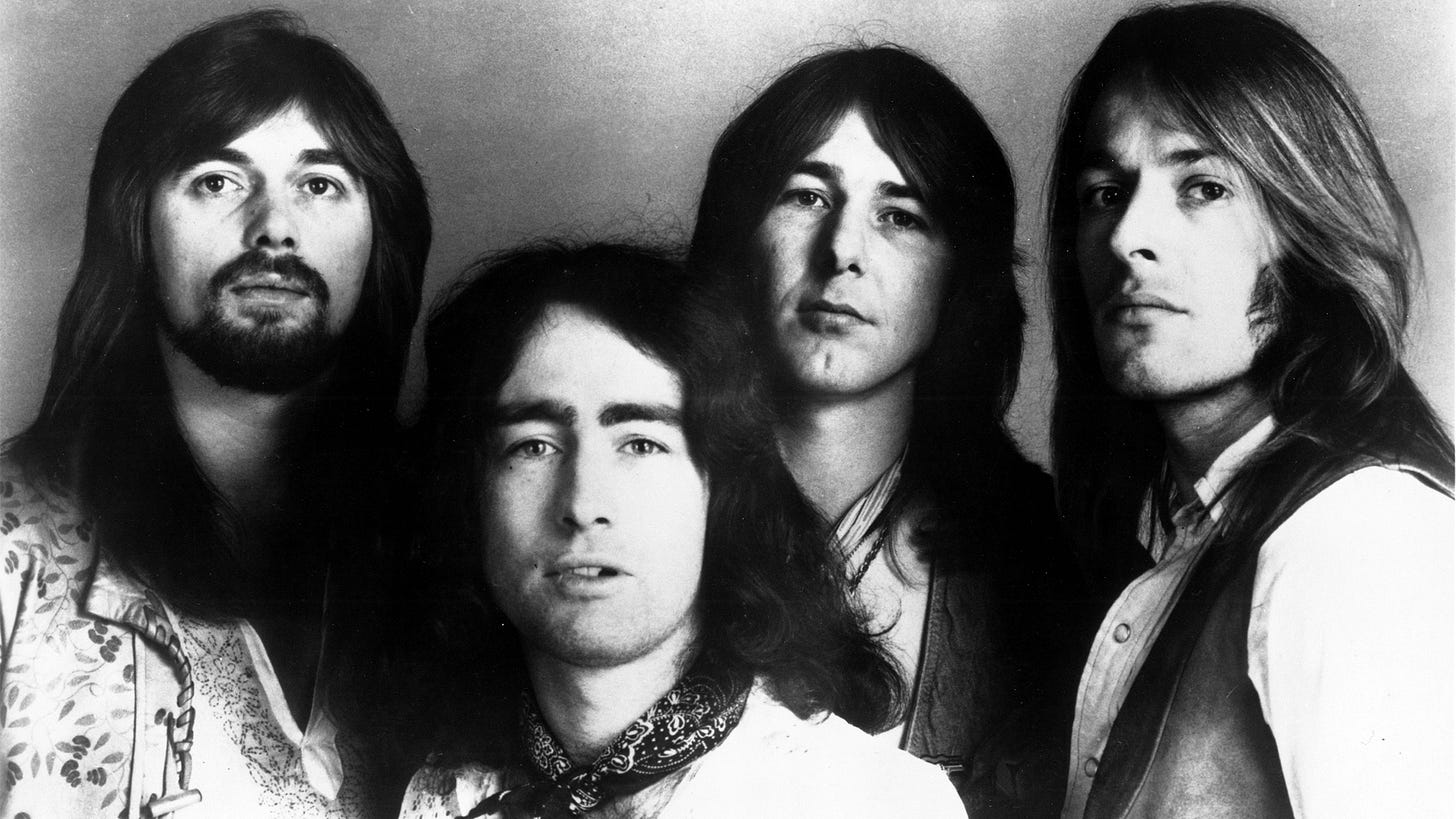
Ex-Free Paul Rodgers and Ralphs had intended only to write songs together, and possibly to make a one-off album as a project. But when Free drummer Simon Kirke asked to sit in, they realized they were nearly a proper group already and went seeking a bassist. They found him in former King Crimson member Boz Burrell.
Rodgers’ bluesy, soulful voice had been the trademark of Free and their worldwide hit “All Right Now.”
Free had split up, and Rodgers had been performing with the band Peace, but he and Ralphs quickly struck up a strong musical partnership, and found that between them they had a dozen or more songs they had written but which had not been used.
“We didn’t actually plan to have a band,” Ralphs said in a 2015 interview with Gibson Guitars. “It was all kind of accidental I suppose. Lucky, really.”
Bad Company had the advantage of becoming one of the first bands to sign to Led Zeppelin‘s Swan Song label after they found management in Led Zeppelin’s manager, Peter Grant.
Bad Company’s 1974 self-titled debut album was an instant hit, going five times platinum, backed by the Ralphs-penned single “Can’t Get Enough.”
But Mick was not done, and he revamped Mott’s “Ready For Love’.”
During Ralphs' tenure with Bad Company, in addition to these two hit songs, the group released more hits, "Can’t Get Enough," and "Silver, Blue and Gold." In the quiet, beautiful glow of this song, his guitar still sings what words can’t say. Two other songs wer hits, "Shooting Star" and "Rock Steady."
“Can’t Get Enough” is often mistakenly called “Can’t Get Enough of Your Love” because of its chorus lyrics, which would be their biggest hit single, peaking at #5 on the Billboard Hot 100.
“We actually did the whole thing in one take live,” Ralphs said in an interview. “It wasn’t perfect, but we just said, ‘Yeah, that’s great, it’s going to capture the moment.’ That’s what I like to do in recording. It doesn’t have to be perfect as long as it captures the moment. That’s what it’s all about.”
Their 1974 self-titled debut album was their only #1 album on the Billboard 200 and #3 in the UK.
With immediate success, the band’s albums were full of radio-ready anthems, and its live sound was perfectly suited to the 1970s height of arena rock.
Bad Company's Boz Burrell, Paul Rodgers, and Mick Ralphs perform onstage in 1975. (Image credit: Fin Costello/Redferns)
Bad Company’s 1975 follow-up, Straight Shooter, was also a hit, going to #3 on album charts in both the Billboard Hot 100 in the U.S. and the UK Albums Chart.
Its opening track, “Good Lovin’ Gone Bad,” written by Ralphs, reached its highest chart position at #36 on the Billboard Hot 100 in the US and was also a Top 40 hit in the UK.
The follow-up, “Feel Like Makin’ Love,” reached #10 on the Billboard Hot 100 and would remain in rotation on classic rock radio for decades.
Bad Company’s first three albums all reached the US and UK Top Five, and after a slight falling-off in sales with Burnin’ Sky (1977), they scored another blockbuster with Desolation Angels (1979).
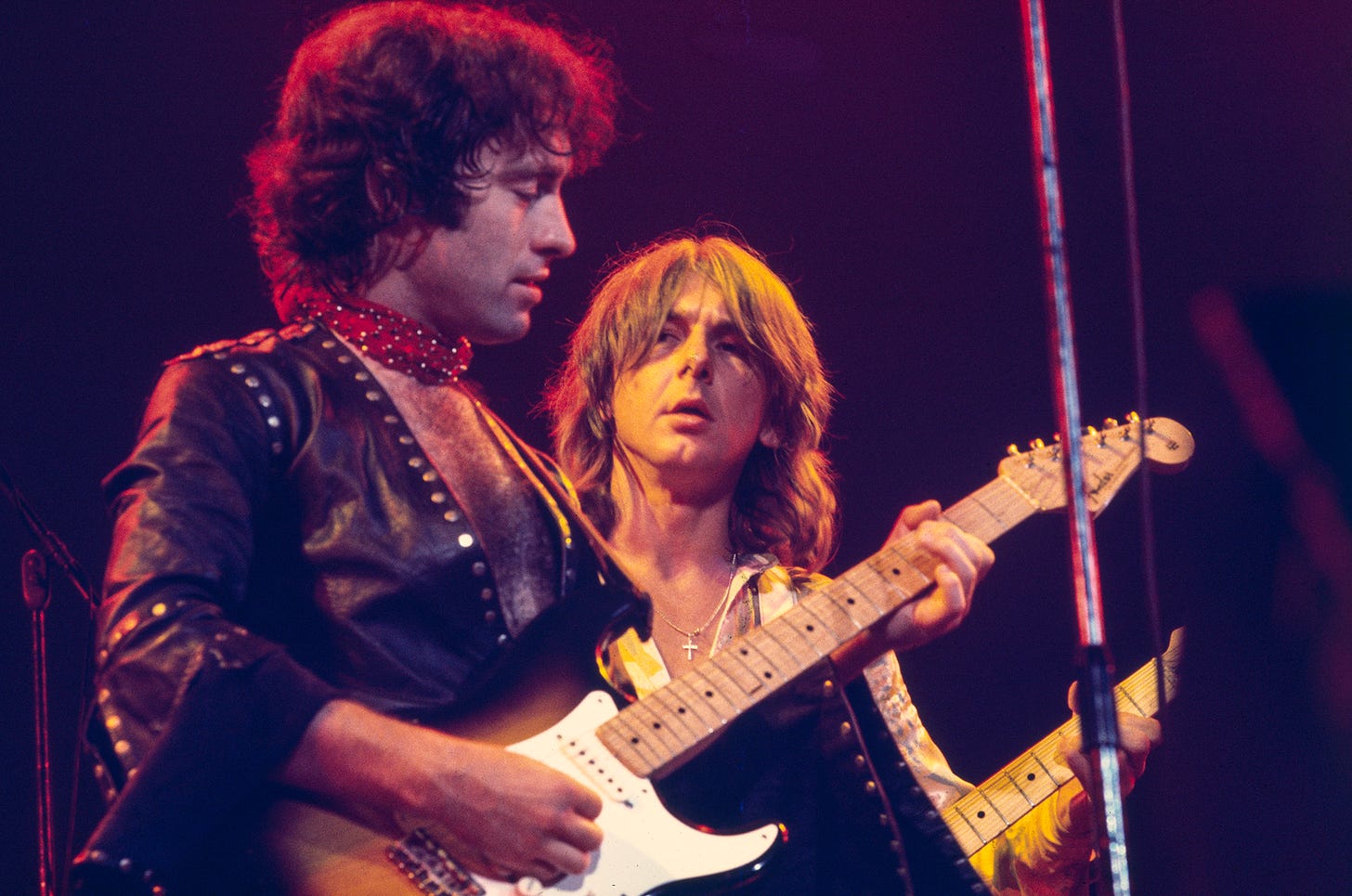
Ralphs was the featured cover artist for the September 1979 issue. (Image credit: Future)
The group disbanded after the release of Rough Diamonds (1982), with Ralphs commenting: “Bad Company had become bigger than us all and to continue would have destroyed someone or something.”
When Bad Company reformed in 1986 with Brian Howe as lead vocalist, Mick Ralphs was indeed part of that lineup, serving as lead guitarist from 1986-1999. However, Paul Rodgers was not part of the reformed band - he had left Bad Company, and Brian Howe was brought in specifically to replace Rodgers as the vocalist.
This reformed lineup with Brian Howe went on to achieve additional success, including the platinum-certified album Holy Water.
Howe remained with the band until 1994. From 1994 until 1998, yet another version of the group featured Robert Hart as lead vocalist, but by then, the original Bad Company magic had largely dissipated.
In conclusion, Mick had a good run with Bad Company, but he had other projects in mind at that point.
What can you tell us about Ralphs’ post-Bad Company career?
Outside the group, Ralphs released the solo albums Take This (1984), the live album It’s All Good (2001), and That’s Life (2003).
In the 21st century, assorted iterations of Bad Company featuring the trio of Ralphs, Rodgers, and Kirke once again took to the road, touring in Britain and the US in 2009-10. In 2013, Bad Company joined Lynyrd Skynyrd for a joint 40th anniversary tour.
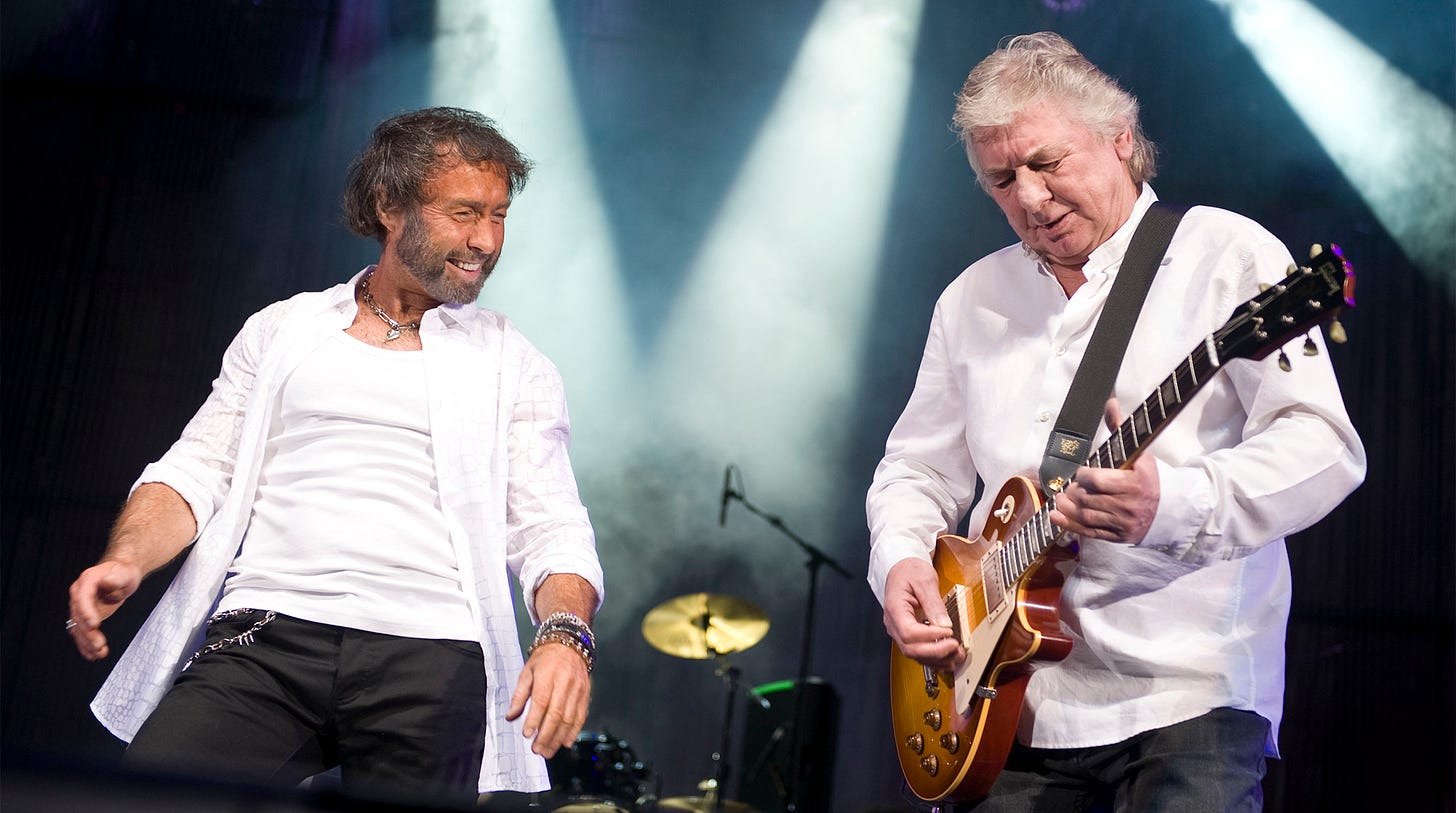
He also made two albums with the Mick Ralphs Blues Band, I Should Know Better (2013) and If It Ain’t Broke (2016).
Also in 1984, he was part of David Gilmour’s touring band, promoting Gilmour’s solo album About Face.
He became friendly with George Harrison (they were neighbours in Henley-on-Thames) and they co-wrote the song Flying Hour.
This was released in 1988, on an EP included with copies of the limited edition book Songs By George Harrison.
Paul Rodgers, left, and Mick Ralphs, members of Bad Company, in New York, 1999. Photograph: Jim Cooper/AP

Ralphs' final performance took place in 2016 when he played at the O2 Arena in London.
In conclusion, Mick played up until he suffered a debilitating stroke and was bedridden and in a nursing home until the end of his life.
What is the upshot of his career, and what is a tribute to his playing and songwriting?
Ralphs has received deserved recognition since Ralphs’ passing comes just months ahead of Bad Company’s induction into the Rock and Roll Hall of Fame later this year – per Rolling Stone, he said was “elated” about the induction in an email to Billboard earlier this year, and per an Instagram post.
There is also a heartfelt tribute from Ian Hunter, recalling Mick Ralphs with warmth and camaraderie:
Ian Hunter Pays Tribute to Mick Ralphs: ‘Goodbye my friend’
🎙️ What Ian Hunter Said:
In the short tribute, Hunter describes Ralphs as “my friend”, offering a simple yet powerful farewell: “Goodbye, my friend.”
Though concise, his words—delivered with measured affection—reflect decades of a close bond through Mott the Hoople, underscoring Ralphs’ enduring impact both personally and musically.
🎶 Why It Matters:
This expression isn’t just a polite condolence—it’s a musician’s salute, a peer’s recognition of Ralphs’ talent and character. Ian’s use of “my friend” conveys a deep sense of loss shared by those who knew him best.
In conclusion, no elaborate eulogy, but in a few honest words, Ian Hunter encapsulates the respect and affection Ralphs inspired among his fellow artists.
References, memories, and tributes:
Here are twelve leading articles that focus primarily on Mick Ralphs’ musical contributions, celebrating his legacy with Mott the Hoople, Bad Company, and beyond:
🎸 Featured Obituaries & Tributes (News Outlets)
The Washington Post — “Mick Ralphs, guitarist for Bad Company and Mott the Hoople, dies at 81”
Highlights Ralphs’ blues-driven riffs, key songs like “Can’t Get Enough” and “All the Young Dudes,” and his lasting impact on ’70s hard rock (washingtonpost.com).The Guardian — “Mick Ralphs obituary”
Focuses on his songwriting, solo work, collaborations (e.g., David Gilmour, George Harrison), and his signature blues-rock guitar style (theguardian.com).AP News — “Mick Ralphs, founding member of Bad Company and Mott the Hoople, dies at 81”
Discusses his influence in crafting classic hits, his stroke, and upcoming Rock & Roll Hall of Fame induction (apnews.com).People — “Bad Company Guitarist Mick Ralphs Dead at 81: ‘He Left Us with Exceptional Songs and Memories’”
Emphasizes Ralphs’ songwriting and bandmates’ reflections on his legacy (people.com).
🗞️ Leading Coverage from Music & News Sites
American Blues Scene — “Mick Ralphs, Founding Guitarist of Bad Company and Mott the Hoople, Dies Aged 81”
Celebrates his “disciplined guitar work and significant contributions to 1970s rock” (americanbluesscene.com).NME — “Bad Company and Mott The Hoople legend Mick Ralphs has died, aged 81”
Includes bandmates’ tributes and chronicles his career from Doc Thomas Group to Bad Company (nme.com).The Independent — “Mick Ralphs death: Bad Company and Mott the Hoople guitarist dies aged 81”
Details his songwriting of “Can’t Get Enough” and “Ready for Love,” plus his post-band work (the-independent.com).
🎶 Guitar-Focused Music Press
GuitarPlayer — “How Mick Ralphs’ stolen guitar inspired Mott the Hoople hit”
A nostalgic, guitarist-centric look at his influence and origin stories behind key songs (guitarplayer.com, en.wikipedia.org).Guitar World — “An amazing and versatile guitarist … has died at 81”
Highlights his blues-rock foundation, style, and bandmate reflections (guitarworld.com).
🌍 Regional & Niche Outlets
Chron.com — Coverage quoting Paul Rodgers and Simon Kirke, spotlighting Ralphs’ songwriting and early career (chron.com).
KSLA / WTAP — Regional outlets echoing his key songwriting credits and band formation story .
Consequence — “Mick Ralphs, Bad Company and Mott the Hoople Guitarist, Dead at 81”
Focuses on his career milestones, classic hits, and bandmate tributes (consequence.net).
More on Ralphs with Ian Hunter is available in my On Track Ian Hunter book.
Trusted Book Advisor to C-Suite | Manuscript Doctor 🚨 | Transforming Drafts into Authority Assets | Strategic Ghostwriting & Publishing Guidance | Literary CPR for Elite Experts | PhD | Voice Talent | Podcaster
On Skool, where are you from? Could you take a picture of your writing space?
Subscribe to my LinkedIn newsletter
Know what you want? You can now review my Application for Strategic Book Development
💎 Paid Tier (Serious Authors)
Want the full playbook? Exclusive strategies, client case studies, and private Q&As are inside the paid tiers.
Price:
$19.99/month or $199/year (Premium positioning)
$499/year for “Inner Circle” access
What’s included:
✨ The Authority Playbook: monthly deep-dive guides (2,000–4,000 words)
E.g., “The 5-Part Framework I Use to Resuscitate Dead Drafts”
🎙 Private mini-podcast: The Doctor Is In (quick hits on publishing trends, behind-the-scenes insights)
📚 Case studies of successful book transformations
🧠 Subscriber-only “Ask The Doctor” Q&A posts
🚨 Priority booking for consults (subscribers get first access to my calendar)
Elite:
🏆 The Doctor’s Roundtable: $499/year for serious authors
Includes quarterly group video coaching calls + manuscript feedback.
Elite advice for high-level thinkers.




